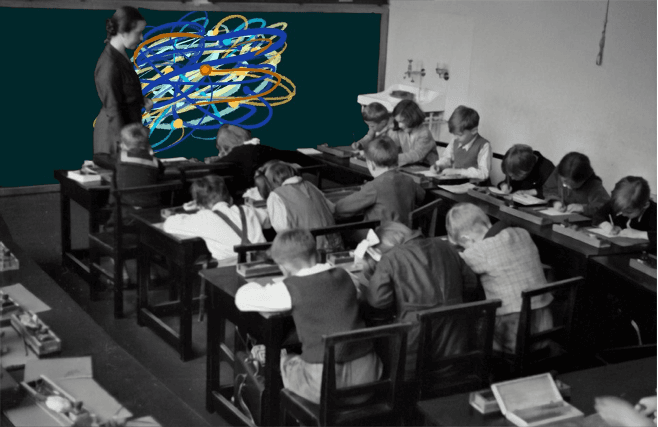Diving into the world of Quantum Physics as a complete Physics novice: it is more confusing than your average food label. But it is also much more exciting. 'Quantum: new rules or a whole new game?" was the title of the public event where a number of experts spoke about quantum computers' role in the future. Quantum physics has already had quite an impact on the world (in the development of nuclear power and LCD screens, for example) and that impact, with the promises of the quantum computer, seems likely to lead to profound changes for society. During the event it became clear that the gap between quantum experts and non-experts is no longer tenable. The dialogue on possible applications and impact of quantum computers on our society should be broader. After all, can we only say something about the future when we understand what quantum computers can do, or can we do it before then? Waag Futurelab's mission is to demystify and democratise new technology. High time to dive into the world of quantum mechanics!
What I have learned about quantum physics so far
Quantum physics is the physical theory that describes how the smallest particles behave.
Quantum computers are computers that use complex (and elusive) interactions between small, isolated particles such as photons and electrons, which can be understood and described by quantum physics. The potential computing power of a quantum computer compared to an ordinary computer is enormous because it can perform the same computation but over a very large amount of data.
As quantum scholar Richard Feynman concluded: if you think you understand quantum mechanics, you haven't understood it.
A quantum literally means the minimum amount of something, by which it is or can be quantified. In the first decades of the 20th century, physicists discovered, among other things, that reality at very small (subatomic) scales seems best defined by quanta rather than a continuum, hence the name quantum physics (or quantum mechanics). Currently, it is the most accurate theory for describing the physical properties of matter and energy at the most fundamental level.
Note to self: still don't understand it? Don’t worry. Understanding quantum physics is almost fundamentally impossible, because reality as we experience it simply does not match the phenomena of reality described on that microscopic scale. So understanding is then not necessarily your goal; because as quantum scholar Richard Feynman stated: if you think you understand quantum mechanics, you haven't understood it.
Co-creation session: Quantum for Good (or bad?)
Prior to the public event, a quantum co-creation session took place first: at Quantum for Good, I got a crash course in quantum physics from concept developer Douwe-Sjoerd Boschman. He explained how the concepts of superposition and entanglement are at the heart of quantum physics. Many will have heard of the thought experiment 'Schrödinger's cat': you put a cat in a box with a bottle of deadly gas with a 50 per cent chance of it opening within an hour. After an hour, you have no way of knowing whether the cat is alive or dead. It is in a superposition of dead and alive at the same time. Only when you open the box does the cat turn out to be alive or dead. Participants in the co-creation session were challenged to think about future scenarios in which good or bad applications of quantum could play a role. At the end of the session, several prototypes of quantum applications were presented.
This series of co-creation sessions on quantum brings together and inspires students, artists and tech-minded citizens. The next two co-creation sessions are planned for late November 2022 and March 2023.
Are you interested? Then email albana[at]waag[dot]org
Quantum: new rules or a whole new game?
At the Theatrum Anatomicum in Waag, Professor of Solid State Theory Carlo Beenakker bit off the headlines with the less reassuring notion that we know what cannot be done, but not what can when it comes to quantum computing. 'We are currently at the forefoot of the biggest change since the advent of the abacus,' Beenakker says. 'For the first time, we are going to do computing differently again.' Indeed, while the quantum computer promises to be bizarrely smart, half the times you ask how much 2+3 is, it gives the wrong answer.
'We know what cannot be done, but not what can.'
Beenakker also mentions the huge promise that quantum computing holds in terms of money, jobs, as well as eradicating rare diseases. Can these promises be realised? 'Quantum physics has already had a huge impact on our society,' says Professor Lieven van der Sypen (TU Delft) and initiator of the Quantum Inspire platform, a prototype quantum computer open to all. Indeed, quantum physics has already allowed us to use lasers, among other things. Van der Sypen leaves us with the appeal: 'Quantum: do try this at home!' There is nothing for it but to embrace the technological future with quantum computers. But how will quantum change our world? Professor engineer Deborah Nas advocates closing the gap between quantum experts and non-experts. Drawing on a 1964 excerpt from the future-predicting science fiction writer Arthur C. Clark, in which Clark predicts that by 2014 we will not need to be in the same physical location to work, Nas argues that the future can be predicted but you can also be incredibly wrong. Indeed, Clark also predicted that cities would no longer exist in our time.
A perhaps unpredictable application of quantum is the creation of quantum music. Quantum computers work with qubits (a qubit is a unit of quantum information), where a bit is either 1 or 0, a qubit can be 1 or 0 at the same time, on and off. Quantum musician Andrija Pavlović dropped that he sometimes feels like a qubit; he is a composer/pianist as well as a scientist within the Quantum Music project.
Want to read more about how Pavlović works? Then read the interview 'Andrija Pavlović about quantum music.'
Author of the book Quantum Physics is NOT weird and Academy of Humanities lecturer Paul van Leeuwen started his talk with the proposition: 'information is the elephant in the room'. Because what is information anyway and to whom or what does information have meaning? Meanwhile, it was not the concept of 'information' that was the elephant in the room, but my limited powers of comprehension. I promptly decided to order Van Leeuwen's book.
Waag Futurelab's starting point 'technology is not neutral' (from the essay A Cyborg Manifesto by Donna Haraway) was underlined by researcher Responsible-AI Oumaima Hajri's inspiring talk. Hajri brings her expertise on AI so that we can learn from what can go wrong when it comes to deploying new technology in society. 'You can look at AI on different levels: as a tool or infrastructure but also as an ideology.' The developments around quantum computers come with enormous potential, but also responsibility. After all, who is turning the knobs and who is reaping the benefits? Time for a continuation of this conversation, building an even stronger bridge between quantum experts and non-experts on the social impact of the quantum computer on our society.
Want to stay informed about co-creation workshops and/or public programmes on quantum? Subscribe to the newsletter.
This blog is part of the Quantum Inspire project in which Waag aims to give more users access to the technology so they can program and execute quantum algorithms independently. Waag will work with users to explore the implications of quantum computing for society.


